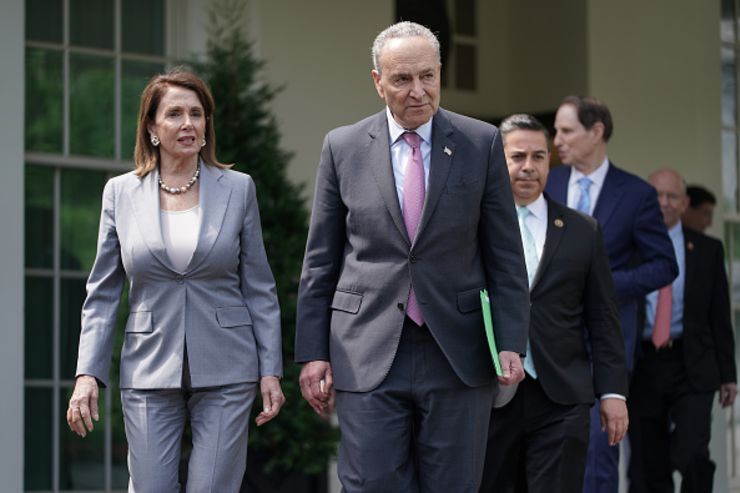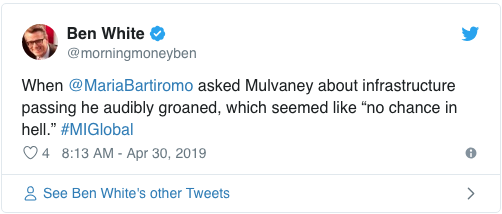KEY POINTS
- President Donald Trump and leading Democratic lawmakers agreed a plan to overhaul U.S. infrastructure would need $2 trillion, Senate Minority Leader Chuck Schumer, D-N.Y., says.
- Schumer says “there was good will in this meeting” between the White House and Democrats — a tone that was “different than some of the other meetings we’ve had.”
- Ahead of the meeting, House Democrats unveiled an infrastructure road map saying the majority of funding should come from the federal government.

Chip Somodevilla | Getty Images
President Donald Trump and leading Democratic lawmakers agreed a plan to overhaul U.S. infrastructure would need $2 trillion, Senate Minority Leader Chuck Schumer, D-N.Y., said Tuesday.
“We agreed on a number, which was very, very good,” Schumer said.
Rebuilding the country’s aging infrastructure is one of the few bipartisan issues in American politics. Democrats and Republicans alike have stressed the importance of repairing and modernizing U.S. transportation, broadband, water and power projects, and both parties have submitted separate funding proposals to achieve those goals.
Yet the issue has languished on Capitol Hill — and the Trump administration’s repeated attempts to refocus lawmakers through the label of “infrastructure week” have become a running joke in Congress.
Schumer said “there was good will in this meeting” between the White House and Democrats — a tone that was “different than some of the other meetings we’ve had,” he added.
At a previous meeting between Schumer, House Speaker Nancy Pelosi and Trump in December, the leaders openly clashed on camera over the president’s proposed border wall. Trump said at that meeting that he would be “proud” to shut down the government in pursuit of funding to build a wall along the U.S.-Mexico border. The government partially shut down less than two weeks later, and stayed that way for 35 days — the longest such interval in U.S. history.
Schumer told reporters after the meeting Tuesday morning that there was no inherent conflict in working with Trump to pass infrastructure while, at the same time, Democrats in the House and Senate push forward in multiple investigations centered around Trump, his finances and his associates. “The two are not mutually exclusive and we were glad we didn’t make it that way,” Schumer said.
The meeting was held off camera. The White House did not immediately respond to CNBC’s request for comment on Schumer’s remarks.
Speaking outside the White House just after the meeting, the Democratic leaders also said that the two sides also found common ground on some of the priorities that an infrastructure plan should address. Pelosi told reporters that Trump agreed on the importance of broadband infrastructure, a signal that a broader, more modern definition of infrastructure will be the basis for further discussions.
Schumer said that another meeting will take place in three weeks.
Ahead of the meeting, a coalition of multiple groups of Democrats in the House unveiled an infrastructure road map stating that the majority of funding for any bill should come from the federal government.
Trump’s latest plan prior to the Tuesday meeting, however, aimed to use $200 billion in federal funds to spur a total of $1 trillion in spending from state and local governments, as well as private partners.
Despite their differences, Pelosi, Schumer and a raft of Democratic lawmakers met with Trump and members of his team at the White House Tuesday morning to discuss infrastructure.
“Our message is, let’s work together,” Pelosi said Monday. “The American people understand the need to build the infrastructure of our country. Let’s find a solution.”
White House acting chief of staff Mick Mulvaney appeared much less optimistic about the meeting. At the Milken Institute Global Conference in Beverly Hills on Tuesday, Mulvaney reportedly groaned when asked whether he believed infrastructure reform would pass.

House Minority Leader Kevin McCarthy, R-Calif., had also cast doubt on the success of the meeting.
“I don’t think their meeting will go very well,” McCarthy said minutes before the talks were scheduled to start.
“No matter what you do on infrastructure you have to have a bipartisan,” McCarthy said. “And they’re walking into a meeting today saying you have to change the tax cuts to the American public and raise taxes on the American public if they were to go along with an infrastructure bill. I think that’s a loss.”
Neither Mulvaney nor McCarthy were listed as attendees for the talks.Here’s who attended the meeting, according to the White House:
The White House
President Donald J. Trump
-Ivanka Trump, Advisor to the President
-Larry Kudlow, Assistant to the President and Director of the National Economic Council
-Shahira Knight, Assistant to the President and Director of the Office of Legislative Affairs
-Sarah Sanders, Assistant to the President and Press Secretary
-Russ Vought, Acting Director of the Office of Management and Budget
-Pat Cipollone, Assistant to the President and Counsel to the President
-Kellyanne Conway, Assistant to the President and Senior Counselor
Trump Administration
-Secretary Elaine Chao, Department of Transportation
-C.J. Mahoney, Deputy United States Trade Representative
Members of Congress
-Speaker Nancy Pelosi (CA-12)
-Rep. Steny Hoyer, House Majority Leader (MD-05)
-Rep. James Clyburn, House Majority Whip (SC-06)
-Rep. Ben Ray Lujàn, House Assistant Speaker (NM-03)
-Rep. Richard Neal, House Ways and Means Committee Chairman (MA-01)
-Rep. Peter DeFazio, House Transportation and Infrastructure Committee Chairman (OR-04)
-Sen. Charles Schumer, Senate Minority Leader, New York
-Sen. Richard Durbin, Senate Minority Whip, Illinois
-Sen. Patty Murray, Senate Assistant Democratic Leader, Washington
-Sen. Debbie Stabenow, Senate Chairwoman of Policy & Communications Committee, Michigan
-Sen. Ron Wyden, Senate Finance Committee Ranking Member, Oregon
-Sen. Tom Carper, Senate Environment and Public Works Committee Ranking Member, Delaware
























